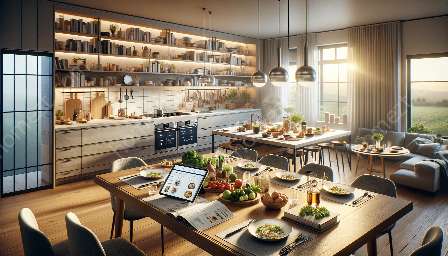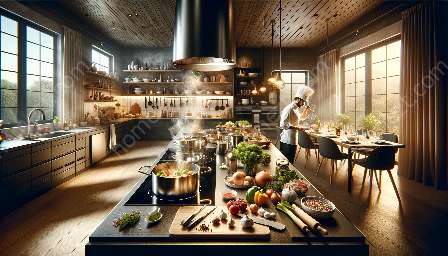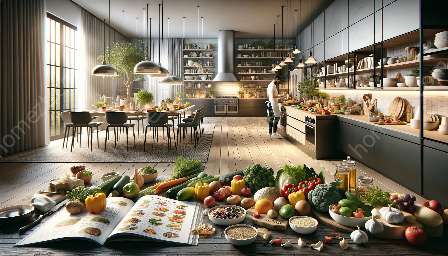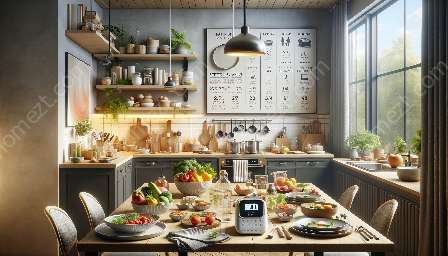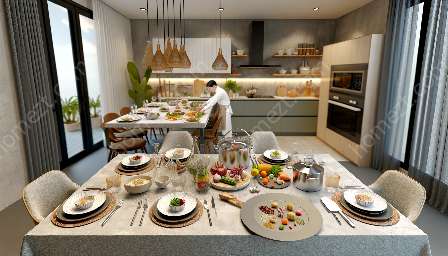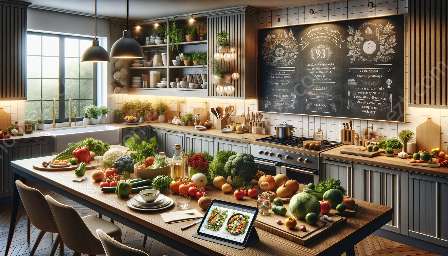Cooking techniques play a crucial role in meal planning and are essential for creating delightful dining experiences. By mastering these techniques, you can elevate your cooking skills and improve the quality of the meals you prepare.
Understanding different cooking methods, such as sautéing, braising, and roasting, can help you create diverse and flavorful dishes while effectively utilizing various kitchen tools and equipment. Let's explore some key cooking techniques and their relevance to meal planning and the overall kitchen and dining experience.
Cooking Techniques and Meal Planning
Meal planning involves the strategic organization of meals for a specific period, ensuring that they are nutritious, delicious, and varied. Utilizing different cooking techniques allows for a wider selection of dishes, making meal planning more exciting and manageable. Here are some essential cooking techniques that complement meal planning:
- Sautéing: This quick-cooking method involves cooking food rapidly in a small amount of fat over high heat. It's perfect for preparing vibrant stir-fries, searing vegetables, and creating flavorful sauces. Sautéing enables you to add variety to your meal plan with an array of colorful and nutritious dishes.
- Braising: Braising involves slow-cooking food in a liquid, resulting in tender, flavorful dishes. This technique is ideal for preparing hearty stews, succulent meats, and flavorful braised vegetables. Including braised dishes in your meal plan adds comforting and robust options for any occasion.
- Grilling: Grilling imparts a distinct smoky flavor to foods and is perfect for cooking a wide range of ingredients, from meats and seafood to vegetables. By mastering grilling techniques, you can include delicious and healthy grilled options in your meal plan, adding variety and excitement to your culinary repertoire.
- Baking and Roasting: These versatile techniques are essential for creating delectable baked goods, roasted meats, and hearty casseroles. Incorporating baking and roasting into your meal planning enables you to prepare a diverse range of dishes, from savory entrees to tempting desserts, ensuring a well-rounded and satisfying meal schedule.
Enhancing Kitchen & Dining Experiences
Applying various cooking techniques not only contributes to meal planning but also enhances the overall kitchen and dining experiences. By embracing these techniques, you can elevate the quality of your dishes and create memorable dining moments for yourself and your loved ones.
Utilizing Cooking Tools:
Understanding different cooking techniques involves using specific tools and equipment to achieve the desired results. From sauté pans to roasting racks, having a well-equipped kitchen allows you to explore and master various cooking methods, enhancing the efficiency and enjoyment of meal preparation.
Creating Flavorful Dishes:
Mastering cooking techniques enables you to infuse your dishes with depth of flavor and texture, turning simple ingredients into remarkable culinary creations. Whether it's adding a caramelized finish to a sautéed vegetable or achieving a perfect sear on a steak, these techniques enhance the overall taste and appeal of your meals.
Exploring Culinary Creativity:
Diversifying your cooking techniques encourages culinary exploration and creativity. By experimenting with different methods, you can craft unique and diverse dishes, adding excitement to your kitchen and dining experiences while continuously enhancing your cooking skills.
Conclusion
As demonstrated, understanding and mastering various cooking techniques are essential elements of effective meal planning and contribute significantly to the enjoyment of kitchen and dining experiences. By incorporating diverse cooking methods into your culinary repertoire, you can expand your meal options, elevate the quality of your dishes, and create unforgettable dining experiences.


